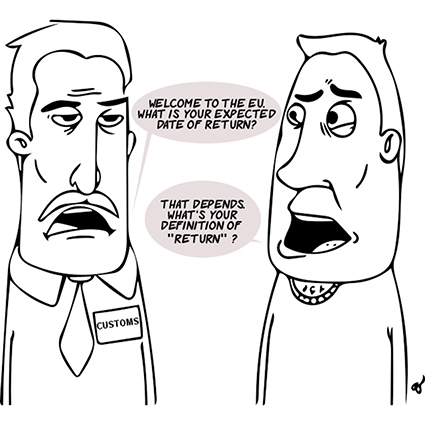The Awkward Truth that Georgians Don’t Get: Ogden on the Visa Liberalization
OP-ED
Georgia's visa liberalization with the European Union has been unanimously welcomed all across the country; as well as having the very obvious benefit of allowing Georgians to travel to the Schengen Zone without needing to apply for a visa, it has also shown that the EU has – finally – kept its word. Georgians are now understandably clamoring to take advantage of the cheap Wizz Air flights out of Kutaisi at the first opportunity, and those of us with Georgian spouses rejoice at the thought that we will no longer need to go through any ridiculous European visa process for a five-day holiday. A celebratory mood is in the air, God is in his heaven, and all seems right with the world (with the exception of the lunatic inhabiting the White House, Britain's uncertain future, and the wholesale slaughter going on down in Syria).
I, however, the cynical Englishman sitting on Georgia's shoulder, have some reservations.
In 2012, billionaire Bidzina Ivanishvili and his Georgian Dream party defeated the United National Movement government in Georgia's parliamentary elections; anyone present in Georgia at the time will remember the almost fanatical (and frankly frightening) passion of Bidzina's supporters. People voting for unqualified or unusual political choices invariably have a reason behind their choice, and if their motives are impossible to condone, they are at least able to be understood. I would not cast a ballot for Labor's Jeremy Corbyn under any circumstances whatsoever, but I can see why a left-wing voter might support him; I find the man and his ideas ridiculous and unrealistic, but I could say that about almost any socialist figure. Even (some) Trump supporters based their choice on a few ideas (loosely) resembling policy: immigration, crime, security.
Georgians voted for Bidzina Ivanishvili because they thought he would share his wealth with them.
I know this because I had many Georgians tell me so at the time, and when contradicted they told me that he had performed many acts of charity and built Sameba Cathedral (wow!). When I pointed out that his construction of the church had done little to ease the plight of the beggars lying at its gates, I was told I didn't understand Georgia (this, by the way, is a blanket defense used by Georgians when faced with an awkward truth they would prefer not to admit).
Already I have had similar sentiments expressed over the EU's visa liberalization. Many people seem entirely unaware that Europe's offer does not extend to labor, while others shrug off the fact that they are not entitled to work, and point out that Germany has accepted millions of Syrians and Iraqis and let them settle, as though that has anything to do with it.
Attitudes of this kind are hardly rare in Georgia. Many times, I have heard 'I will go to live and work in Germany/Canada/England/America. My friend is there, they will help me'. When pressed for exactly how a work visa will be achieved, or how they can hope to work in a country in which they do not speak the language, I have always been met with a shrug and subsequent hostility over criticisms of their flawless plan. Others have openly stated their intention to illegally immigrate, and given little thought to the consequences.
Brussels dragged its feet over granting Georgia access to the Schengen Zone solely due to the fact that various EU countries could not agree on a Suspension Mechanism, ie. the kill switch Brussels can use if Georgians fail to play by the rules...and given that the Georgian government, busy trumpeting its own success, seems to have done little in explaining exactly what the new visa regime entitles Georgians to, I'm fairly confident that many Georgians will deliberately or inadvertently violate the agreement. I even heard of some people who thought that the visa-free policy came into effect this week; whatever information campaign the government has launched, it is clearly not informative enough.
After the recent release of the shocking details over the amount of traffic collisions in Georgia, a friend of mine (who has driven in this country for years and its sufficiently traumatized) told me that he thinks Georgians simply cannot be trusted with cars; having written about this some weeks ago, I find it hard to completely disagree. While nobody will die from any violation of Georgia's wonderful new visa regime with the EU, it is more important than ever for Georgians to show that they can be responsible. I wish the government good luck, I have a strong feeling they'll need it.
Tim Ogden












